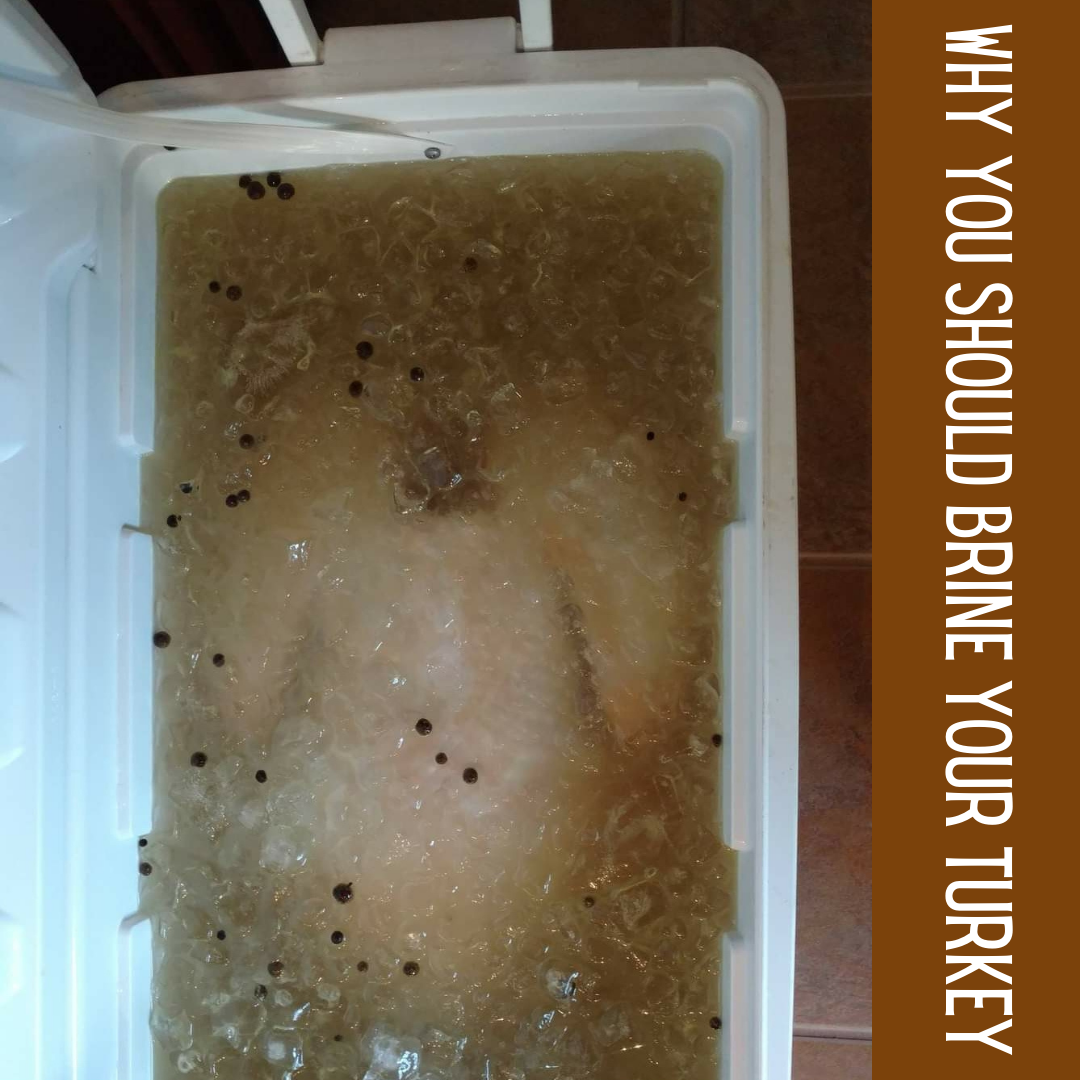I first heard about brining your Thanksgiving or Christmas turkey from a fellow Weston A Price foundation member.
Before I heard about brining, I would cook my Thanksgiving or Christmas turkey and pray that it came out moist.
When I started brining my turkey ahead of cooking, it always came out super moist after I cooked it!
This was 11 years ago! I have brined my turkey ever since.
What is brining?
Brining is a method in which meat is placed in a mixture of water and salt (and other seasonings sometimes) for several hours before the meat is cooked.
Turkey is an ideal candidate for brining since it is pretty lean and therefore doesn’t have a lot of fat to keep the meat moist during cooking.
What does brining do?
Brining does several things to the meat.
the salt seasons the meat from the inside out
it helps break down muscle proteins which makes it more tender and helps in moisture absorption
the water mixture helps keep the turkey moist while in the oven
If you’ve purchased a pasture raised turkey, you already have a head start on the flavor, but brining it will take it to the next level!
CAUTION: if you’ve purchased a turkey from a grocery store, you need to check that it hasn’t already been brined. Many turkeys are injected with a brine solution to add moisture, included Kosher turkeys. You will not want to brine it again as it’ll make it too salty to eat. Look for a turkey labeled as natural in the store.
What are the best turkey brine ingredients?
Salt is the foundational ingredient in the brine. I recommend Redmond’s Real Salt, as it’s from a prehistoric salt deposit close to the small town of Redmond in Utah, which is over 150 miles away from the Great Salt Lake.
Not all salt is created equally. If you are using kosher salt, you need to add twice as much as it is larger in crystal and lighter by volume.
Make sure you are not using salt with iodine as it will spoil the flavor.
To create a proper brine, you’ll need 1 cup of salt per gallon of water, which works out to 1 tablespoon of salt per cup of water.
While not necessary (but I prefer it), its a good idea to add something sweet to your brine. The sugar will offset the salt flavor and adds to the flavor of the turkey. Citrus, allspice, cane sugar, cloves are some options.
Dissolve the salt & sugar
It’s important that you dissolve the salt and sugar (if you are using it) into the water. Any crystals left over are going to float to the bottom of the container and just sit there and not penetrate the turkey.
To do this, boil some water and then add to the salt and sugar. You don’t need alot of water, you just want to dissolve the salt and sugar and make a concentrated brine (you’ll be adding more water which will dilute it).
Let the salt/sugar concentrate cool and then pour over turkey in the container.
Brine a thawed or frozen turkey?
So the first year I brined the turkey, I thawed it ahead of time and then brined the turkey for an hour per pound (ie for a 15 lb turkey, brine for 15 hours).
But the following year, I was pressed for time, so I placed a frozen turkey in the brine and let it brine for 48 hours. It worked fabulously.
The turkey actually thaws faster in the brine than in the fridge.
I’ve brined a frozen turkey for the last decade!
What container should the turkey be brined in?
It is important that you keep the turkey cold while in the brine.
You also need a large, nonreactive container, which can be plastic, glass or stainless steel.
a large, food-safe sealable bag like Reynold’s Oven Roasting Bag for Turkeys or Ziploc’s XL Storage Bag
a large stainless steel stockpot or large trash can or 5 gallon food grade bucket
a large ice chest/cooler
I use a large ice chest/cooler. I leave it in the garage or porch (as long as the temps at night get cooler), and add ice as needed. It also means I’m not taking up space in the fridge!
You’ll need enough brine to completely submerge the turkey in the container.
rinse the turkey after brining
By the time your turkey has finished brining, a fairly good amount of salt has settled on the skin. If you were to pull the turkey out of the brine and start preparing it with your preferred method (smoker, oven, fryer, grilling), the flavor of the meat would be very salty.
This isn’t from the salt in the meat but from the salt on the meat!
This is why you must rinse the turkey thoroughly before you do anything with it.
Rinse the turkey well, then submerge it in cold water, making sure you rinse out the inside as well. Every surface needs to be rinsed!
CAUTION: you do not need to add any salt to this turkey when cooking it.
After you’ve brined the turkey, prepare as you would normally.
Brining is a great first step in enjoying a delicious turkey no matter if you roast, smoke, grill or fry it!
If you are using a spice rub, seasoning or stuffing on the turkey, do not use one with added salt. Your turkey will be too salty!
For my favorite brine recipe (the one I’ve used for 11 years) click here


